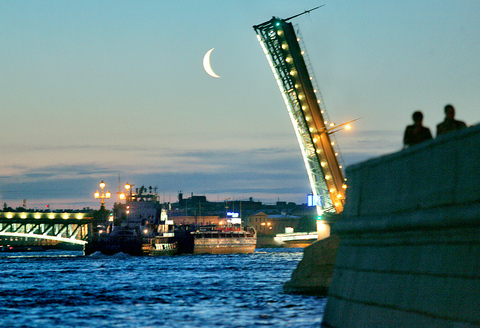The Poles say, not without a certain pride, that they are the only ones ever to occupy the Kremlin. That was in the early 17th century, almost 200 years before Napoleon and 300 before Hitler failed in their attempts to do so.
In Moscow not long ago, the national day celebration was switched from Nov. 7, commemorating the Bolshevik Revolution, to Nov. 4, when the Russians rid the Kremlin of the hated Poles.
Clearly, the present bad state of relations between Russia and Poland has plenty of historical precedents. Still, relations between the nations are as bad as they have been since the collapse of the Soviet bloc in 1989.

PHOTO: AP
The good news is that neither side is threatening the other with invasion or occupation, so the history of wars and partitions seems unlikely to repeat itself.
But every day it seems something nasty or angry is said by politicians or commentators on one side or another of the Polish-Russian divide, and the nastiness echoes the remaining insecurities and suspicions of Eastern Europe after the Cold War.
"It's not a result of Polish policy but of the internal processes of Russia," Jacek Cichocki, the director of the Polish Center for Eastern Studies, a research group attached to the Foreign Ministry, said while explaining, very much from the Polish perspective, the poor state of relations.
Analysts seem to agree that the immediate cause of tension was the lead role played by Poland in the Ukrainian conflict of late last year, when President Aleksander Kwasniewski clearly sided against the Russian-supported presidential candidate and with the Orange Revolution of Viktor Yushchenko.
As the Poles see it -- and, for obvious reasons, they have a special understanding of Russia -- Ukraine's reorientation toward the EU and the West is a major, even historic additional increment in Russia's steady loss of influence in its own region, a loss of influence that began with the success of solidarity in Poland in 1989. But Polish-Russian relations, which were good through most of the 1990s, soured well before the Orange Revolution.
"The problem started much earlier last year," Cichocki said. "The first reason was the very nervous reaction of Moscow to the EU enlargement," which took place officially last May, and brought seven former Soviet bloc members, including three former Soviet republics -- Latvia, Lithuania and Estonia -- into the embrace of the democratic West.
Polish analysts Russia's "bad behavior" to its failure to carve out a post-Cold-War identity for itself. That means it retains many aspects of Russian imperialism, the wish to dominate its neighbors, and certainly never to tarnish its image by admitting past crimes. At the same time, while the Russians are tempted to recognize the EU and its expansion east as an economic opportunity, they see it as a danger, especially to Russian prestige.

Brazil, the world’s largest Roman Catholic country, saw its Catholic population decline further in 2022, while evangelical Christians and those with no religion continued to rise, census data released on Friday by the Brazilian Institute of Geography and Statistics (IBGE) showed. The census indicated that Brazil had 100.2 million Roman Catholics in 2022, accounting for 56.7 percent of the population, down from 65.1 percent or 105.4 million recorded in the 2010 census. Meanwhile, the share of evangelical Christians rose to 26.9 percent last year, up from 21.6 percent in 2010, adding 12 million followers to reach 47.4 million — the highest figure

A Chinese scientist was arrested while arriving in the US at Detroit airport, the second case in days involving the alleged smuggling of biological material, authorities said on Monday. The scientist is accused of shipping biological material months ago to staff at a laboratory at the University of Michigan. The FBI, in a court filing, described it as material related to certain worms and requires a government permit. “The guidelines for importing biological materials into the US for research purposes are stringent, but clear, and actions like this undermine the legitimate work of other visiting scholars,” said John Nowak, who leads field

‘THE RED LINE’: Colombian President Gustavo Petro promised a thorough probe into the attack on the senator, who had announced his presidential bid in March Colombian Senator Miguel Uribe Turbay, a possible candidate in the country’s presidential election next year, was shot and wounded at a campaign rally in Bogota on Saturday, authorities said. His conservative Democratic Center party released a statement calling it “an unacceptable act of violence.” The attack took place in a park in the Fontibon neighborhood when armed assailants shot him from behind, said the right-wing Democratic Center, which was the party of former Colombian president Alvaro Uribe. The men are not related. Images circulating on social media showed Uribe Turbay, 39, covered in blood being held by several people. The Santa Fe Foundation

NUCLEAR WARNING: Elites are carelessly fomenting fear and tensions between nuclear powers, perhaps because they have access to shelters, Tulsi Gabbard said After a trip to Hiroshima, US Director of National Intelligence Tulsi Gabbard on Tuesday warned that “warmongers” were pushing the world to the brink of nuclear war. Gabbard did not specify her concerns. Gabbard posted on social media a video of grisly footage from the world’s first nuclear attack and of her staring reflectively at the Hiroshima Peace Memorial. On Aug. 6, 1945, the US obliterated Hiroshima, killing 140,000 people in the explosion and by the end of the year from the uranium bomb’s effects. Three days later, a US plane dropped a plutonium bomb on Nagasaki, leaving abut 74,000 people dead by the